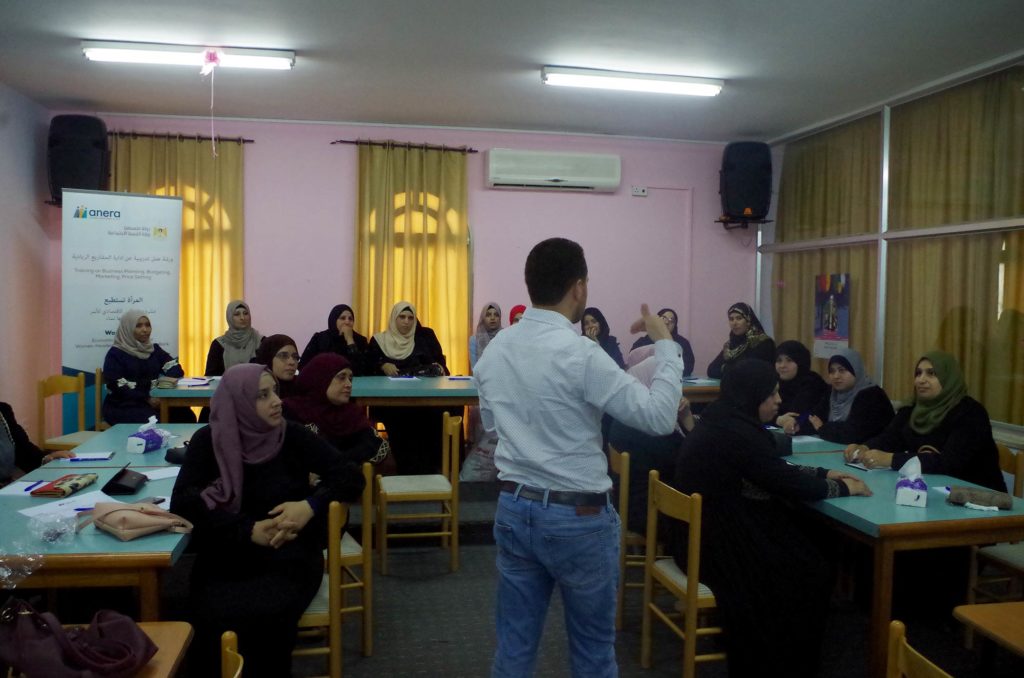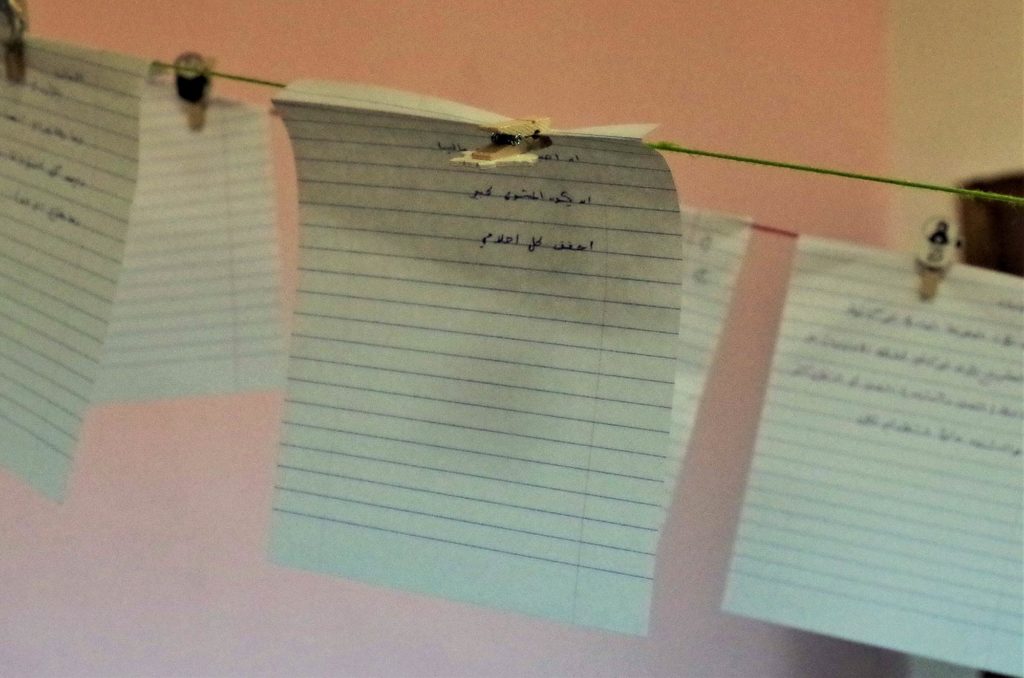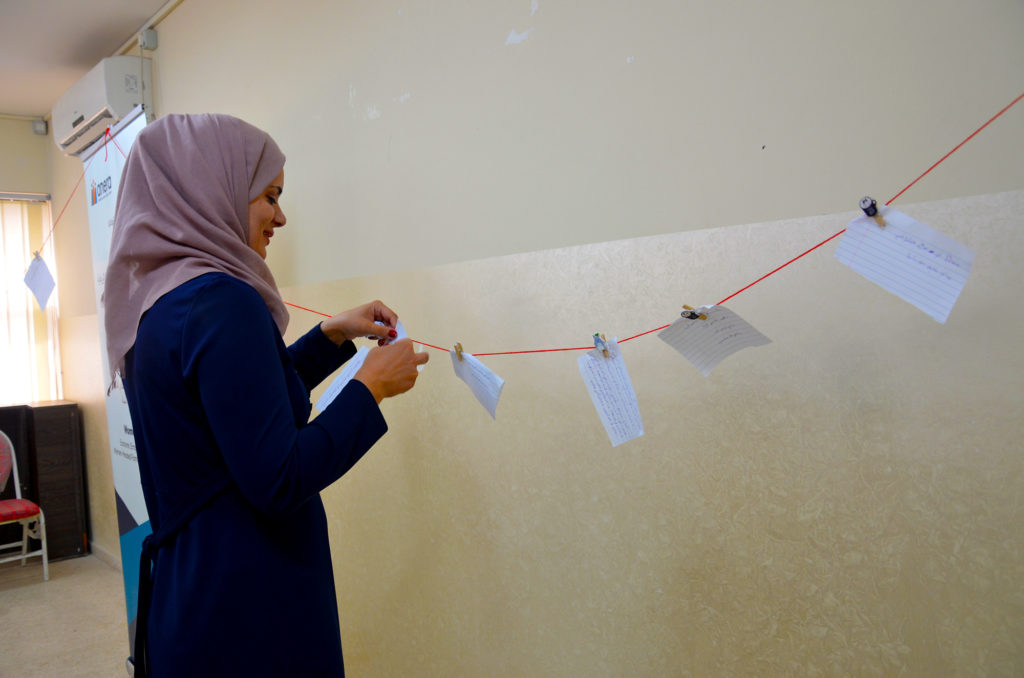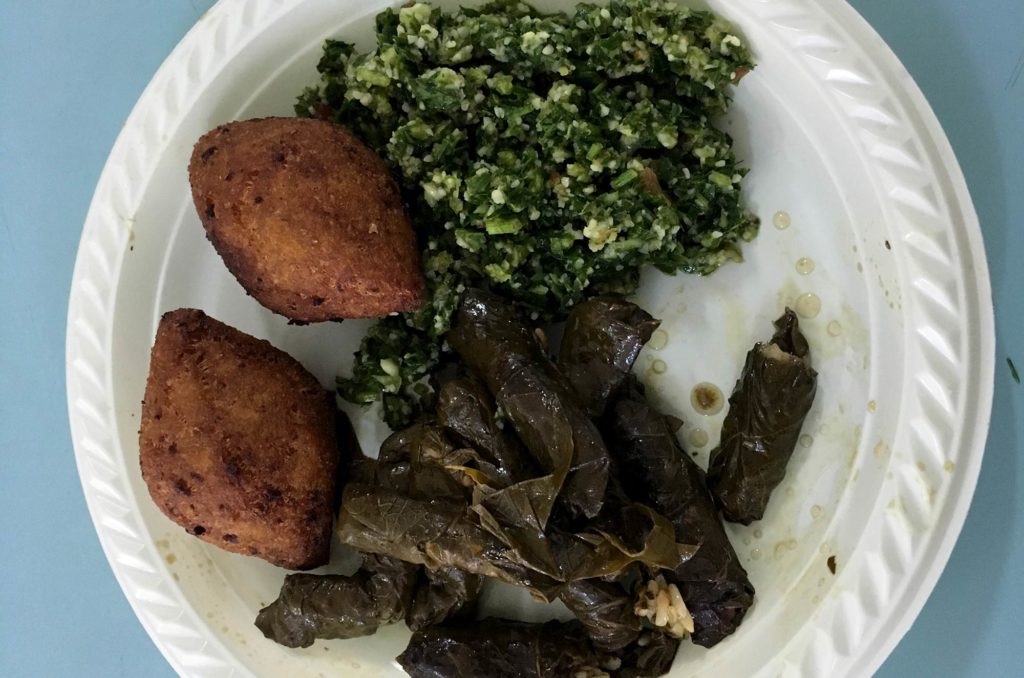Women’s empowerment, from proposal to reality
Posted in: Programs
By Holly Jordan
Holly is the new business development manager at Anera. Previously, she served as visiting assistant professor of religion at Roanoke College in Virginia.
Recently, I was fortunate to take my first visit to Anera’s country offices in Lebanon and Palestine. In my previous life in academia, my research related to the Arab-Israeli conflict. Finally seeing the places I had written about moved me in ways I could not have predicted.
While in Palestine, I traveled through much of the West Bank. My country office colleagues narrated the way, telling me about their homeland.
One of the most beautiful places we visited was the city of Qalqilya. Picture a sub-tropical Los Angeles surrounded by farms, with beautiful sandstone buildings and streets lined with palm trees and bougainvillea. Qalqilya is situated in the West Bank, near the 1949 Armistice border with Israel. It is a vibrant city, full of fresh fruits and vegetables. The climate there is perfect for growing everything.
We went to Qalqilya to visit one of the training sessions for Anera’s Women Can program, generously funded by Islamic Relief USA. The goal of Women Can is to give women a means to earn their own income.
Anera identified 100 women who are heads of household and who have an idea for a small business that will help them support themselves and their families. Most of these women had little or no income, yet they shouldered the heavy responsibility of being the primary breadwinner for their families. Some of them are divorced or widowed. Others have spouses with chronic health problems. All of these women support at least five children or other dependents.
Some women already have a business but need assistance to be able to scale it up. Others are starting from scratch. The businesses are based on the local market and the interests and skills of each woman.
Anera provides marketing and business classes to the women, mentoring and training in their particular areas of interest, and a start-up grant to buy the equipment they need to pursue their plans. For example, we might purchase a sewing machine, kitchen appliances, or a professional-quality camera — the tools essential to each woman’s small venture.
Training day for new Palestinian women entrepreneurs
I sat in a room with two dozen women starting day one of their four-day business and marketing training. They were shy at first, not knowing one another. The instructor, however, anticipated their apprehension and facilitated exercises to make them interact with one another.


They started by standing in a circle, passing a box of matches around. Each woman would strike a match and have the length of time it took for the match to burn out to introduce herself and pitch her business idea and her goals.
The purpose of the exercise was to help the women to present their “elevator speech” about their business. But as their stories progressed, I saw the meaning of the exercise went deeper. As each woman spoke, I could see them opening up and empathizing with each other. They were realizing how much they had in common. Many of them had stories and challenges that were very similar.
The facilitator led the women through an exercise where each had to write down both a dream and a fear about their new business. They then pinned their fears up on one side of the room and their dreams on the other. Again, they all saw how much they had in common: hopes for a better life for their families and fears that their skills would not be enough to achieve their goals.


Hand-in-hand with fostering hopes and dreams is Anera’s psychosocial support for the women. Many suffer from depression, anxiety, and post-traumatic stress. These women also often come from conservative rural villages where women are not expected to have public roles. Some of the women express fear or nervousness about how their communities will view them. Fortunately, my colleague Nariman Othman has a background in sociology, psychology, and special education. She is ready always to sit and talk with the women privately, reassuring them until they are comfortable enough to return to the workshops.


Nariman herself is one of the strongest women I have ever met. Self-made and highly educated, she has lived and worked in Saudi Arabia and back home in Palestine. Through her confidence and beautiful personality, she sets an example for these women.
In one of my favorite moments of the day, Nariman encouraged the women of the cohort to chase their dreams. “Be driving a BMW this time next year!,” she urged playfully. While the women laughed at her joke, you could see them taking her encouragement to heart.
At the end of the four days, the women received a certificate of completion for their training. For most of them, ranging in age from their mid-twenties to their fifties, this is the first certification they have ever received.
I wasn’t able to attend their graduation, but I was told it is quite the ceremony! I wish I had been there to celebrate with them.
Seeing the first successes of Women Can
Women Can was one of the first proposals I worked on when I started at Anera last year. Seeing the early results and successes of the program brought tears to my eyes. For example, a woman from one of the first cohorts catered the lunch provided during the training. She has launched a successful enterprise selling meals from her home. I am happy to report that our meal was delicious.


I am grateful for having had the opportunity to meet some of the women of Women Can. The program is improving not only the lives of the brave, talented women who are participating, but also the lives of their family members and their communities. My visit to Qalqilya showed me the tangible victories that come from my own work in new business development, and from the dedication of Anera’s staff and supporters who are a part of planning, implementing, and sustaining our amazing programs.
The views expressed herein are those of Anera and shall not, in any way whatsoever, be construed to reflect the official opinion of IRUSA, its Islamic Relief affiliates, or its donors.
OUR BLOG
Related
I wanted to thank you — our Anera donor community — for your support during Ramadan, the holiest and most significant month for Muslims worldwide. Despite the hardships, the spirit of Ramadan prevails, with communities around the world coming together…
